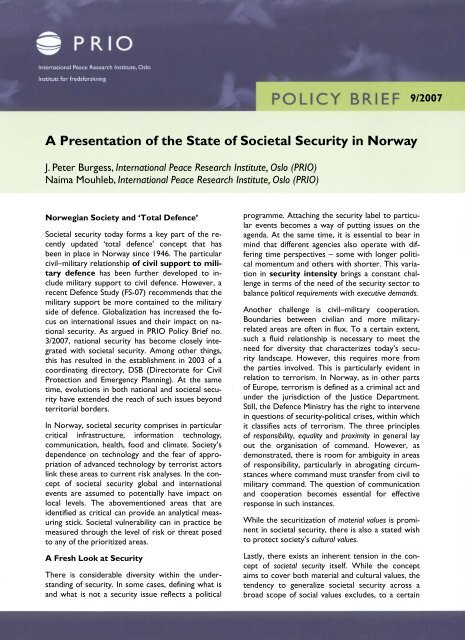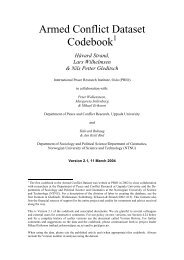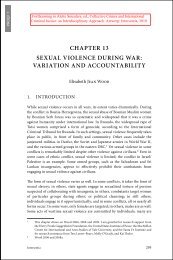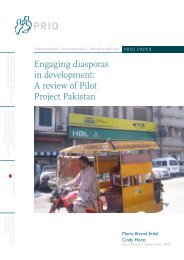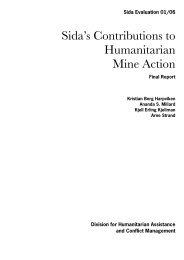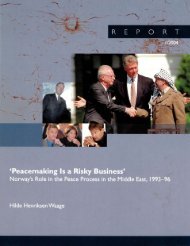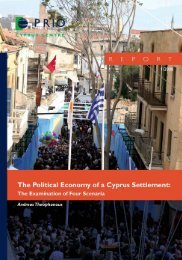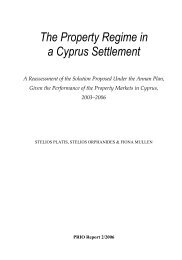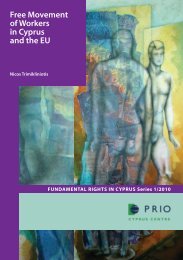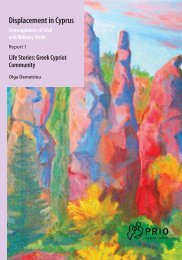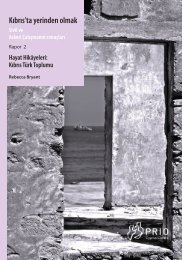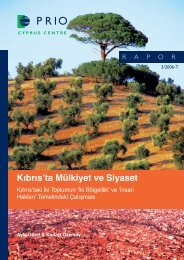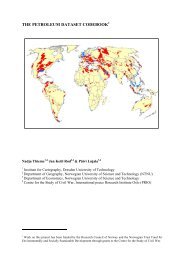A Presentation of the State of Societal Security in Norway - PRIO
A Presentation of the State of Societal Security in Norway - PRIO
A Presentation of the State of Societal Security in Norway - PRIO
You also want an ePaper? Increase the reach of your titles
YUMPU automatically turns print PDFs into web optimized ePapers that Google loves.
degree, <strong>the</strong> value <strong>of</strong> <strong>the</strong> <strong>in</strong>dividual, as well as <strong>in</strong>dividualor isolated societal groups.Invisible ValuesNorwegian social values are <strong>of</strong>ten articulated <strong>in</strong>terms <strong>of</strong> democratic culture, and democracy is <strong>of</strong>tenexpressed as <strong>the</strong> ultimate security referent tobe protected. Paradoxically, <strong>the</strong> protection <strong>of</strong> <strong>in</strong>dividuals<strong>in</strong> society or groups with<strong>in</strong> society is notdirectly a part <strong>of</strong> <strong>the</strong> strategy, despite <strong>the</strong> obviousfact that it is <strong>in</strong>dividuals who make up society, andthat <strong>in</strong>dividualism is <strong>of</strong>ten praised as a democraticvalue. This paradox forms <strong>the</strong> tacit background formuch policymak<strong>in</strong>g <strong>in</strong> security affairs. This is <strong>the</strong>case despite <strong>the</strong> fact that most scholarly literaturehighlights this problem as underly<strong>in</strong>g and susta<strong>in</strong><strong>in</strong>ga wide variety <strong>of</strong> social groups’ perceptions <strong>of</strong> <strong>in</strong>security.One can easily ask whe<strong>the</strong>r societal securityis <strong>in</strong>deed adequately assured when <strong>the</strong>re are groupsthat feel threatened by <strong>the</strong> establishment that is<strong>in</strong>tended as <strong>the</strong> provider <strong>of</strong> security. Such groupscan be political, ethnic, religious or generational,depend<strong>in</strong>g on circumstances. National and globalevents can affect <strong>the</strong>se groups, or <strong>the</strong>ir perceptionsas a group, as with communist groups dur<strong>in</strong>g <strong>the</strong>Cold War or Muslim groups follow<strong>in</strong>g <strong>the</strong> 2001World Trade Centre attacks. The exclusive andexclusionary potential <strong>of</strong> societal security must beconsidered <strong>in</strong> policymak<strong>in</strong>g.Empirical and Ideational ComponentsIt is difficult to p<strong>in</strong>po<strong>in</strong>t <strong>the</strong> exact empirical andideational components <strong>of</strong> Norwegian societal security,as <strong>of</strong>ficial understand<strong>in</strong>gs vary from <strong>the</strong> verybroad to <strong>the</strong> narrow. There are some elements,though, that are repeated and that may <strong>of</strong>fer anoutl<strong>in</strong>e. Revenues from oil and gas resources form<strong>the</strong> basis <strong>of</strong> <strong>the</strong> Norwegian standard <strong>of</strong> liv<strong>in</strong>g <strong>in</strong> <strong>the</strong>future and give <strong>the</strong> state room to manoeuvre <strong>in</strong> <strong>the</strong><strong>in</strong>ternational arena. This is one critical empiricalaspect. In terms <strong>of</strong> ideational components, <strong>the</strong>reare two aspects that are visible across differentconceptualizations. First is <strong>the</strong> sovereignty <strong>of</strong> <strong>the</strong>Norwegian state. The impact <strong>of</strong> <strong>Norway</strong>’s colonialpast and its delicate position dur<strong>in</strong>g <strong>the</strong> Cold Waris visible <strong>in</strong> <strong>the</strong> careful attention given to <strong>in</strong>ternationaldiplomatic and strategic position<strong>in</strong>g. Secondis a national image <strong>of</strong> an <strong>in</strong>herent Norwegian socialdemocratic culture, with pr<strong>in</strong>ciples that are understoodas highly concentrated, if not unique. Values<strong>of</strong>ten po<strong>in</strong>ted to are egalitarianism, <strong>in</strong>dividualismand peacefulness.Organizational Challenges <strong>in</strong> <strong>Norway</strong>S<strong>in</strong>ce <strong>the</strong> end <strong>of</strong> World War II, Norwegian preparednesshas been built on a horizontal structure,with an extensive civilian support network for <strong>the</strong>military. With <strong>the</strong> <strong>in</strong>creased reliance on societalsecurity concepts, a number <strong>of</strong> security responsibilitieshave been centred <strong>in</strong> <strong>the</strong> civilian arena.These are executed by both military and civil adm<strong>in</strong>istrations.In matters <strong>of</strong> security political crises, command isreferred to military control. Ow<strong>in</strong>g to <strong>the</strong> primacy<strong>of</strong> <strong>the</strong> military <strong>in</strong> national defence, this is understandable.However, <strong>the</strong> military may face a potentialcommunication problem when it enters <strong>the</strong> civiliandoma<strong>in</strong> while ma<strong>in</strong>ta<strong>in</strong><strong>in</strong>g a military operationalizationthat is not necessarily <strong>in</strong> l<strong>in</strong>e withcivilian expectations <strong>of</strong> transparency and public access.The new Defence Study, FS-07, places considerableemphasis on a more pr<strong>of</strong>essional military, ra<strong>the</strong>rthan one based on conscription. It suggests reformsthat would revise <strong>the</strong> concept <strong>of</strong> ‘total defence’ –with a military less dependent upon civil supportthan previously – and limit <strong>the</strong> military’s tasks <strong>in</strong> <strong>the</strong>civilian arena. This can be read as a wish to distance<strong>the</strong> military from <strong>the</strong> civil, which would represent amove away from current political aims for ‘totaldefence’.However, one might ask: where do <strong>the</strong> limits go?As framed <strong>in</strong> PC 17 and by DSB, societal securityencompasses a wide variety <strong>of</strong> issues that at timeshave little <strong>in</strong> common. DSB issues warn<strong>in</strong>gs on issuesas diverse as terrorism and material flaws <strong>in</strong>household products. The differentiation <strong>of</strong> tasksamong Norwegian <strong>in</strong>stitutions corresponds to asignificant differentiation <strong>in</strong> understand<strong>in</strong>gs <strong>of</strong> security<strong>in</strong> <strong>Norway</strong>. Ga<strong>the</strong>r<strong>in</strong>g <strong>the</strong> threads <strong>of</strong> <strong>the</strong> concept<strong>of</strong> security <strong>in</strong> a new age <strong>of</strong> <strong>in</strong>security has becomeone <strong>of</strong> <strong>the</strong> central challenges <strong>of</strong> <strong>the</strong> new defenceconcept.Total DefenceIn 2000, <strong>the</strong> Willoch Commission set out to determ<strong>in</strong>e<strong>the</strong> need for a reorganization <strong>of</strong> <strong>the</strong> ‘totaldefence’ system at a time when a number <strong>of</strong> voiceswere argu<strong>in</strong>g for a more hierarchical and centralizedsystem. The Commission’s end report, A VulnerableSociety, resulted <strong>in</strong> some efforts to centralize<strong>the</strong> work <strong>of</strong> civil crisis management without tak<strong>in</strong>gaway local responsibility. DSB (Directorate forCivil Protection and Emergency Plann<strong>in</strong>g) wasfounded <strong>in</strong> 2003 as part <strong>of</strong> this plan. DSB is under<strong>the</strong> jurisdiction <strong>of</strong> <strong>the</strong> M<strong>in</strong>istry <strong>of</strong> Justice and <strong>the</strong>Police, report<strong>in</strong>g on issues rang<strong>in</strong>g from terrorismto various local societal concerns.Accord<strong>in</strong>g to <strong>the</strong> ambitions <strong>of</strong> <strong>the</strong> ‘total defence’concept, <strong>the</strong> two complementary parts <strong>of</strong> Norwegiansecurity organization, <strong>the</strong> civil and <strong>the</strong> military,should cooperate more – for example, <strong>the</strong>re should
e improved cooperation between military <strong>in</strong>telligenceand police <strong>in</strong>telligence. In 2006, a large-scalecrisis-management rehearsal was organized, compris<strong>in</strong>gresponses from all responsible parties. Thiswas carried out to test local responses and responsibilities,as well as communication between civilianand military responders, both horizontally and vertically.The conclud<strong>in</strong>g report, Øvelse Oslo 2006 –Evaluer<strong>in</strong>g, revealed, among o<strong>the</strong>r th<strong>in</strong>gs, a certa<strong>in</strong>lack <strong>of</strong> communication between respond<strong>in</strong>g groups.This weak communication l<strong>in</strong>k demonstrates one <strong>of</strong><strong>the</strong> challenges <strong>in</strong>volved <strong>in</strong> <strong>the</strong> approach <strong>of</strong> shar<strong>in</strong>gresponsibilities between civilian and military actors,as well as between sectors. Basic understand<strong>in</strong>gs <strong>of</strong><strong>the</strong> direction <strong>of</strong> command <strong>in</strong> civil–military operationsalso differ.Fur<strong>the</strong>rmore, while PC17 focuses on societal issues,it relies heavily on one particular source, <strong>the</strong>FFI (Norwegian Defence Research Establishment),to provide <strong>in</strong>formation, threat assessments andevaluations. The FFI’s pr<strong>in</strong>cipal analyses have used atechnical and ‘biological’ approach for understand<strong>in</strong>gand measur<strong>in</strong>g risk and (<strong>in</strong>)security as objectspresent <strong>in</strong> society.The result is that societal security is termed <strong>in</strong> alanguage close to <strong>the</strong> military establishment andtechnical analysis. Yet, <strong>the</strong> context <strong>of</strong> societal securityis non-military and <strong>of</strong>ten non-technical. Thehuman factor that is not <strong>in</strong>cluded is critical formany <strong>of</strong> <strong>the</strong> identified risk areas such as radicalizedsocietal groups. An alternative structur<strong>in</strong>g, based on<strong>in</strong>stitutions l<strong>in</strong>ked to s<strong>of</strong>ter ends <strong>of</strong> societal security,can be envisaged <strong>in</strong> order to bridge this lacuna.<strong>Norway</strong> at Risk<strong>Norway</strong> perceives itself as low at risk, yet <strong>the</strong> discourseon security <strong>in</strong> <strong>Norway</strong> has a high pr<strong>of</strong>ile.The closer an event is to <strong>Norway</strong>, ei<strong>the</strong>r geographicallyor culturally, <strong>the</strong> more elevated <strong>the</strong> <strong>in</strong>tensity<strong>of</strong> <strong>the</strong> discourse with<strong>in</strong> <strong>Norway</strong>. In o<strong>the</strong>rwords, events need not take place <strong>in</strong> <strong>Norway</strong> <strong>in</strong>order for <strong>the</strong>m to become visible and relevant. So,<strong>Norway</strong> prepares itself for different eventualities.DSB performs a multitude <strong>of</strong> rehearsals (responseto potential scenarios and <strong>in</strong>cidents), supervisionsand evaluations <strong>of</strong> what may be said to be <strong>in</strong>ternationallyrecognized risk areas, <strong>in</strong>clud<strong>in</strong>g evaluation<strong>of</strong> critical <strong>in</strong>frastructure – that is, <strong>in</strong>frastructure thatsociety is heavily reliant on <strong>in</strong> order to ma<strong>in</strong>ta<strong>in</strong>itself and function. Some <strong>of</strong> DSB’s recent activitieshave <strong>in</strong>cluded evaluat<strong>in</strong>g national electrical systems,organiz<strong>in</strong>g a terrorist attack response rehearsal,and test<strong>in</strong>g crisis communication systems. On <strong>the</strong>o<strong>the</strong>r side <strong>of</strong> <strong>the</strong> security executive, <strong>the</strong> militaryparticipates <strong>in</strong> <strong>in</strong>ternational <strong>in</strong>terventions and operationsthat are politically, if not directly, connectedto societal and national security. The militarymay <strong>the</strong>refore also experience ‘risk’ differentlythan <strong>the</strong> civil adm<strong>in</strong>istration.A Hub for New <strong>Security</strong> KnowledgeDSB regularly publishes its reports on and evaluations<strong>of</strong> different societal concerns. This publish<strong>in</strong>gis part <strong>of</strong> <strong>the</strong> political drive for a more open securitydialogue. One consequence may be <strong>the</strong> identifications<strong>of</strong> risk areas, but also <strong>the</strong> communication <strong>of</strong><strong>the</strong> state as a constant evaluat<strong>in</strong>g body <strong>of</strong> security,risk and threat. This may generate a sense that societyis <strong>in</strong>secure even when PC 17 and DSB statethat it is <strong>the</strong> low level <strong>of</strong> risk that provides opportunitiesto test identifiable security scenarios.What is essential to underscore is that, <strong>in</strong> an erawhere popular, political and strategic perceptions<strong>of</strong> <strong>in</strong>security <strong>in</strong> <strong>Norway</strong> tend toward an <strong>in</strong>termix<strong>in</strong>g<strong>of</strong> societal and strategic security questions, DSBrepresents a hub or meet<strong>in</strong>g place <strong>of</strong> securityknowledge. DSB and <strong>the</strong> Jo<strong>in</strong>t Operative Headquarters(FOKH) alternate yearly <strong>in</strong> chair<strong>in</strong>g <strong>the</strong> CentralForum for Total Defence, while <strong>the</strong> National <strong>Security</strong>Authority (NSM) reports to both <strong>the</strong> Justiceand Defence departments on <strong>the</strong> civil and militarysectors, respectively. DSB possesses <strong>the</strong> analyticalstandpo<strong>in</strong>t for a more unified implementation <strong>of</strong> an<strong>in</strong>creas<strong>in</strong>g hybrid form <strong>of</strong> security knowledge. It isalso important to note that <strong>the</strong> military and <strong>in</strong>formationnetworks (PST and military <strong>in</strong>telligence) arenot transparency-oriented. The articulation <strong>of</strong> securitycan <strong>the</strong>refore be expected to come, to alarge extent, from DSB.However, DSB does not measure any element <strong>of</strong><strong>in</strong>security raised by securitization. Nei<strong>the</strong>r doesDSB move beyond <strong>the</strong> understand<strong>in</strong>g <strong>of</strong> security orvulnerability as objects <strong>in</strong> society.Globalization and DemocracyIn PC 17, Norwegian security th<strong>in</strong>k<strong>in</strong>g is presentedas a total concept that can respond at any po<strong>in</strong>t toa given threat and that is also suited to identify<strong>in</strong>gsecurity issues that would be commonly handled bycivilian departments. An <strong>in</strong>ternational ideational featureis also stressed, namely, that while <strong>in</strong>ternationalevents may have an impact on security at aspecific time, such events must not affect <strong>the</strong> organizationalstructure <strong>of</strong> security. Yet, <strong>Norway</strong> relieson alliances to help protect its sovereignty, whichcommits <strong>the</strong> state to non-national policies. <strong>Norway</strong>’straditional policy is one that adheres to <strong>the</strong>conviction that <strong>the</strong> advancement <strong>of</strong> democracy has along-term positive effect on security. At <strong>the</strong> sametime, lack <strong>of</strong> democracy elsewhere is not considereda direct threat to <strong>Norway</strong>. Preparedness is thus
highlighted as much as response. In this way, understand<strong>in</strong>gs<strong>of</strong> risk comprises that future threat comesto play as much a role as plann<strong>in</strong>g for responses <strong>in</strong>real time.It is essential to bear <strong>in</strong> m<strong>in</strong>d that ‘security stress’ isseen to affect all matters on <strong>the</strong> security cont<strong>in</strong>uumand that overburden<strong>in</strong>g <strong>of</strong> <strong>the</strong> very categories <strong>of</strong>security and <strong>in</strong>security could lead to an erod<strong>in</strong>g <strong>of</strong><strong>the</strong> usefulness <strong>of</strong> <strong>the</strong> concept <strong>of</strong> societal securityand, collaterally, <strong>of</strong> <strong>the</strong> sharpness <strong>of</strong> <strong>the</strong> concept <strong>of</strong>security <strong>in</strong> general. Fur<strong>the</strong>rmore, <strong>the</strong> civil emphasison security organization does not meet <strong>the</strong> challenge<strong>of</strong> <strong>in</strong>dividual or group <strong>in</strong>security faced by certa<strong>in</strong>members <strong>of</strong> society, especially <strong>in</strong> relation toreligious and ethnic m<strong>in</strong>orities.It is important to recall that <strong>the</strong> ma<strong>in</strong> provider <strong>of</strong><strong>in</strong>formation on risk and threat perceptions to bothcivil and military adm<strong>in</strong>istrations is <strong>the</strong> military researchestablishment. The FFI’s primary focus hasbeen to deal with <strong>the</strong> national security <strong>of</strong> society as awhole, and not with potential alienation, fragmentationor <strong>in</strong>security among specific groups or <strong>in</strong>dividuals.On <strong>the</strong> contrary, <strong>the</strong> emphasis <strong>of</strong> currentresearch on threats to <strong>Norway</strong> at best focuses on<strong>the</strong> reverse cause: <strong>the</strong> threat <strong>of</strong> alienated <strong>in</strong>dividualsand fragmented groups on society at large.National ValuesDist<strong>in</strong>ct among <strong>the</strong> ma<strong>in</strong> <strong>in</strong>terests <strong>of</strong> both traditionaland societal security is <strong>the</strong> protection <strong>of</strong> socialvalues. Yet, when one first beg<strong>in</strong>s to identify aset <strong>of</strong> national values, one quickly f<strong>in</strong>ds values thatare shared <strong>in</strong>ternationally. There is no clear or exclusiveNorwegian exception. <strong>Norway</strong> has, however,promoted some values over o<strong>the</strong>rs based onneed, utility and <strong>the</strong> particularity <strong>of</strong> Norwegian geographyand traditions. <strong>Norway</strong>’s history <strong>of</strong> colonialoccupation and suppression has left a greater markon its security th<strong>in</strong>k<strong>in</strong>g, which <strong>in</strong>fluences strategiessought to uphold sovereignty.Effects <strong>of</strong> International Cooperation onNorwegian <strong>Security</strong> OrganizationNOU 2003, The <strong>Security</strong> <strong>of</strong> <strong>the</strong> Nation, stipulates thatit is <strong>the</strong> core <strong>in</strong>terests <strong>of</strong> national concern that areto be protected, not <strong>in</strong>direct or related values suchas <strong>the</strong> <strong>in</strong>terests <strong>of</strong> allied parties. Never<strong>the</strong>less, alliedforces or personnel on Norwegian soil are to beprotected. This conclusion is reached on <strong>the</strong> basis<strong>of</strong> <strong>the</strong> logic that it is <strong>the</strong> sovereignty <strong>of</strong> <strong>the</strong> stateand its security that are to be protected. However,<strong>in</strong> <strong>Norway</strong> – as elsewhere <strong>in</strong> an <strong>in</strong>creas<strong>in</strong>gly globalizedworld – <strong>the</strong>re is no sharp delimitation between<strong>the</strong> <strong>in</strong>ner and <strong>the</strong> outer security <strong>of</strong> <strong>the</strong> stateNOU 2003 suggests that threats stemm<strong>in</strong>g fromterrorist attacks aga<strong>in</strong>st critical <strong>in</strong>frastructureshould be added to <strong>the</strong> traditional issues <strong>of</strong> espionage,war, occupation and attacks on central government<strong>in</strong> <strong>the</strong> penal code section that deals withnational security. That this is suggested even thoughit is acknowledged that <strong>Norway</strong> is at little risk <strong>of</strong>such attacks may demonstrate <strong>the</strong> impact <strong>of</strong> <strong>the</strong><strong>in</strong>ternational climate. Hence, <strong>the</strong> NOU suggestsslimm<strong>in</strong>g <strong>the</strong> understand<strong>in</strong>g <strong>of</strong> ‘national <strong>in</strong>terests’ tocore values with direct national <strong>in</strong>terest, but it simultaneouslyrecognizes threats aga<strong>in</strong>st o<strong>the</strong>rmember-states or allies as affect<strong>in</strong>g Norwegian securitypreparedness.This brief suggests that <strong>Norway</strong> will cont<strong>in</strong>ue to<strong>in</strong>corporate non-Norwegian security <strong>in</strong>terests <strong>in</strong> itsnational agenda to a larger extent than it is able toexport its own security th<strong>in</strong>k<strong>in</strong>g, ow<strong>in</strong>g to <strong>the</strong> role<strong>the</strong> country plays <strong>in</strong>ternationally as a facilitator <strong>of</strong>decisions ra<strong>the</strong>r than an <strong>in</strong>stigator <strong>of</strong> policy. Fur<strong>the</strong>r,ow<strong>in</strong>g to <strong>the</strong> pr<strong>in</strong>ciples <strong>of</strong> equality, responsibilityand proximity, this has potential effects onregional and local levels. Ambiguities <strong>in</strong> <strong>the</strong> conceptualizations<strong>of</strong> <strong>the</strong> civil and military adm<strong>in</strong>istrationsand <strong>in</strong> executive roles also have an impact on both<strong>the</strong> operative and <strong>the</strong> conceptual state <strong>of</strong> societalsecurity <strong>in</strong> <strong>Norway</strong>.About <strong>the</strong> authorsJ. Peter Burgess is a Research Pr<strong>of</strong>essor and Leader <strong>of</strong> <strong>PRIO</strong>’s<strong>Security</strong> Programme; Naima Mouhleb is a Researcher with<strong>in</strong><strong>the</strong> <strong>Security</strong> Programme at <strong>PRIO</strong>. This policy brief was writtenwith <strong>the</strong> support <strong>of</strong> <strong>the</strong> Norwegian Royal M<strong>in</strong>istry <strong>of</strong> Defencefor <strong>the</strong> project Threats beyond Borders: Assess<strong>in</strong>g <strong>Societal</strong><strong>Security</strong> <strong>in</strong> a Global Environment.ISBN: 978-82-7288-254-8


